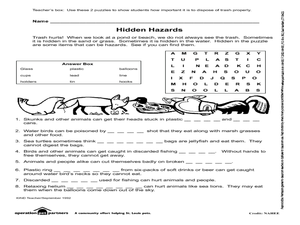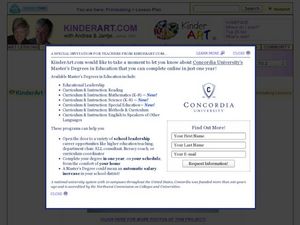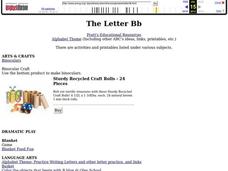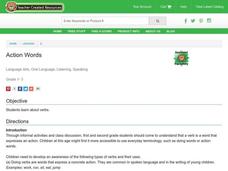Curated OER
Environmental Benefits of Recycling
Fourth graders understand the benefits of recycling. In this recycling literacy lesson, 4th graders read an article and identify the main idea. Students understand the process of transfer to the landfill and discuss how recycling helps...
Curated OER
Fairy Tales
Once upon a time are four words most children are familiar with when reading a fairy tale. But do they know that fairy tales are a great way to learn the literary elements of reading and writing? Use a thorough fairy tale unit...
Curated OER
Art and Influence of Theatre
Students examine an 18th century drawing and produce a skit based on the drawing. In this art analysis lesson, students analyze the story depicted in a drawing and create a skit inspired the scene. Students research the 18th century...
Curated OER
Recycle, Reduce, Reuse and Save a Tree
Students examine how to save and protect trees. In this conservation lesson, students read books about the usefulness of trees, write ideas in their journals about how trees can be used, and make a book of ways to protect trees.
Curated OER
Speak Up for Recycling
Are you looking for ways to enhance a persuasive writing or speech unit? Use this lesson to prompt your young writers to investigate a school recycling program. After conducting research, they present a persuasive, well-organized speech...
Curated OER
The Three R's: Reduce, Reuse and Recycle
Students understand conservation terms. In this three R's (reduce, reuse, recycle) instructional activity, students understand the importance of preserving a clean world and reducing waste. Students sing a song which show importance of...
WakeGOV
Plastic Sight Words
Plastic math? Have young learners count and name the number of plastic items in their centers. Kindergartners match sight word cards to the number of plastics in a given group, while learning that plastics come in all different shapes,...
Curated OER
The Recycle Games
Students play a series of Recycle Games which provide great exercise while teaching about the importance of recycling. They participate in relay races and games that make use of recycled materials and other "trash."
Curated OER
Tempera Paint Lesson Ideas
Pupils create an abstract, non-objective paintings. Students use the various lesson plans to create abstract paintings that include an art with text lesson, a sand textured paint lesson, and a radiating design lesson.
Curated OER
Let's Clean Up Our Act and the Earth!
Students complete activities that help clean up the Earth and protect the environment. In this Earth protection lesson, students go outside and listen to the environment. Students discuss their observations and their role in protecting...
Curated OER
Collocation Pelmanism
Students read and analyze the article, "Lexical exploitation of texts," and become aware of the concept of recycling new words. They practice this concept several times in class before they take on the memory game pelmanism in the follow...
Curated OER
Writing a Political Leader
Students investigate politics by writing a formal letter. In this U.S. Government instructional activity, students discuss political issues they would like to address and research their topic using the Internet. Students locate an...
Curated OER
Recycling Vocabulary
Students engage in activities to increase their vocabulary. They record new vocabulary words in notebooks. They explore word bags to revisit vocabulary words. They use the words in context, create circle stories, play pictionary and...
Curated OER
U.S. Geography: The Northeast
Students investigate U.S. Geography by creating a map in class. In this natural resource lesson, students create a map of the United States and research the Northeast based on their resources and recyclable materials. Students...
Curated OER
Sorting
Students practice sorting books. For this sorting lesson, students play the Flood Game on the PBS web site. With knowledge of the sorting system used by libraries, students sort small numbers of books using categories devised by their...
Curated OER
When is a Block, not a Block?
Students use a stamped shape image to create a piece of imaginative art. In this stamped art instructional activity, students use a stamped shape as a starting point to create their own imaginative piece of art that incorporates the...
Beyond Benign
Plastic Bags
Paper or plastic? Explore the environmental effects of using plastic bags through mathematics. Learners manipulate worldwide data on plastic bag consumption to draw conclusions.
Curated OER
Pendemonium: The Italian Job
Students identify prefixes, roots, and suffixes. In this grammar rules instructional activity, students analyze word parts to determine the meaning of unfamiliar words.
Curated OER
Making Paper
Students explore how natural earth materials are processed into a human-made product. They simulate a manufacturing process by making paper. Students review the importance of recycling in preserving our natural earth resources.
Curated OER
The Letter Bb
Students participate in a variety of activities to practice words with the Bb sound. In this Bb sound lesson, students use craft rolls to create butterflies. Students create a letter book with B words
Curated OER
Flight Dreams - Flight Factors
Learners investigate the physics of flight by experimenting in class. In this history of flight lesson, students define terms such as gravity, lift, and drag in order to better understand how a plane is able to stay in the air....
Curated OER
Ecosystem Energizers
Fourth graders see how the flow of energy through an ecosystem made up of producers, consumers, and decomposers carries out the processes of life and that some energy dissipates as heat and is not recycled.
Curated OER
Action Words
Students discover that a verb is a word that expresses an action. Students at this age might find it more accessible to use everyday terminology, such as doing words or action words.
Curated OER
The Integration of Science and Math Through Ecosystems
Students use the disciplines of math and science to examine ecosystems. In groups, they calculate the amount of supplies they would need to live in the classroom for one day, a week and a year. Using this information, they apply it to...

























